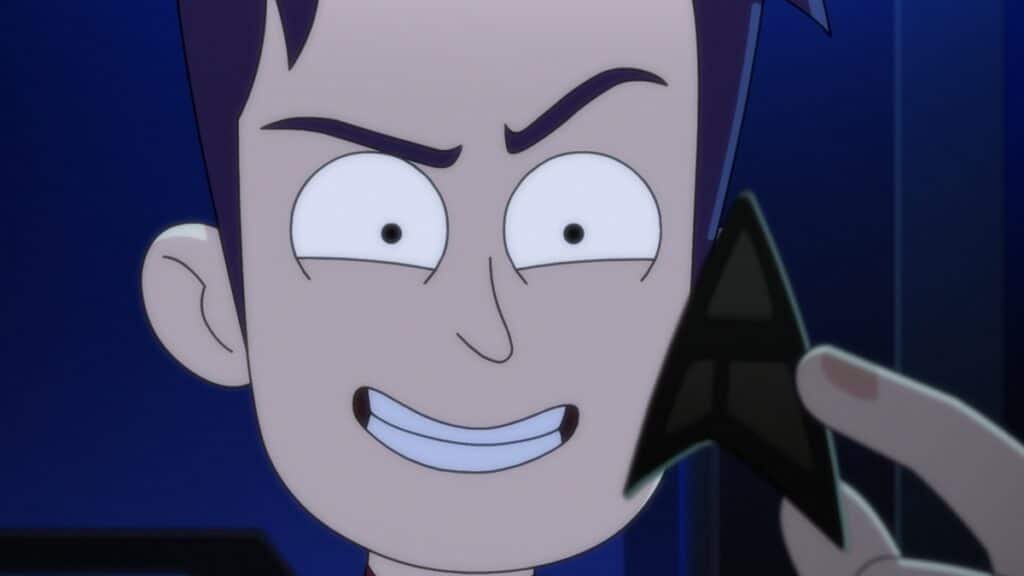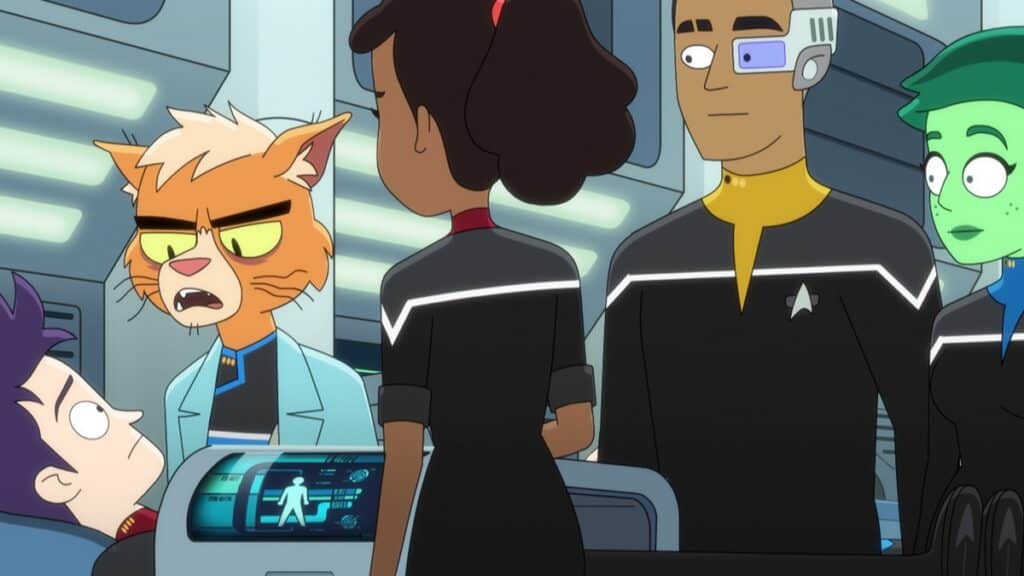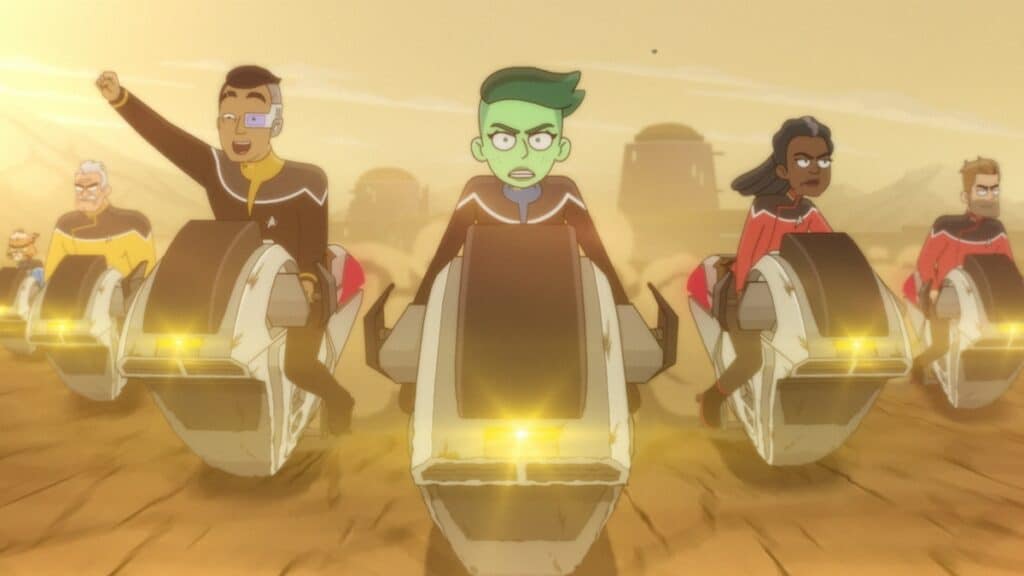Read also:
How to Watch FX Live Without CableHow To Watch AMC Without CableHow to Watch ABC Without CableHow to Watch Paramount Network Without CableA return to the holodeck leads to Boimler’s search for answers and Tendi’s chance to live out her dream.
Good fiction entertains. That’s goal number one: keep the reader, listener, or viewer amused and engrossed. But ideally, it does more than that too. The best stories, in whatever medium, convey some sort of meaning. They help us see ourselves in new ways and make us feel something. The best Star Trek outings, in particular, have their thrills and their drama. But they also express something about humanity, diplomacy, or even life that stays with us long after the credits roll.
To its credit, “Crisis Point 2: Paradoxus” is (like the original “Crisis Point” episode of Lower Decks) first and foremost an entertaining and wide-ranging spoof of Star Trek films writ large. The episode’s Easter eggs are rib-tickling. Its observations on forty years of the franchise’s big-screen outings are sharp. But, to the writers’ credit, the episode is also a commentary on the yin and yang of we wayward souls who take these movies arguably much too seriously.
The personification of such misguided efforts is Boimler (Jack Quaid). He kick-starts the holodeck sequel to the prior “Crisis Point” program with a rousing but convoluted rescue and MacGuffin chase. Except, when he hears some tough news that spurs him to look inward, he then tries to use the program not just as a fun diversion but as a means to reach the meaning of life, much to the chagrin of long-suffering Mariner (Tawny Newsome).
 Paramount+)" class="wp-image-38244"/>
Paramount+)" class="wp-image-38244"/>The pair’s tête-a-tête over the whole thing is entertaining as all hell. The two ensigns’ debates over whether the holo-program should simply be action and excitement or instead make a powerful statement about something mirrors real-life arguments among fans and creatives on both sides of Star Trek. Likewise, their back-and-forths over whether this “Paradoxus” sequel is a worthy successor to Mariner’s original spin on the premise parallels arguments behind-the-scenes and in the audience. And Mariner’s jokes about the convolutedness or rote nature of various plot points and conceits of the genre are in keeping with Lower Decks’ meta-infused, self-referential spirit.
The friction between them takes on a new dimension, though, when Mariner discovers that Boimler’s transporter clone, William, died in his sleep from a simple gas leak. The news shook poor Bradward, making him wonder What It All Means, and convinced him that he should find solace in the various subplots and side characters who promise they have the answers. Mariner does her best to help, despite her earlier skepticism, but it leads a frazzled Boimler down a dark road of dissatisfaction.
Tendi (Noël Wells) isn’t particularly satisfied either. With Boimler off on his navel-gazing adventure, she becomes acting captain within the confines of the story. Tendi jumps at the chance to go on time-hopping capers and drive the piece’s action for once. But her pal, Rutherford (Eugene Cordero), treats the program as the stakes-free holographic diversion that it is. His nonchalance at something she takes seriously frustrates Tendi, and their dynamic plays out as they leap through amusing trope after amusing trope plucked from Star Trek’s numerous cinematic adventures.
To its credit, “Crisis Point 2: Paradoxus” is first and foremost an entertaining and wide-ranging spoof of Star Trek films writ large.
And by (starship-needing) god, the spoofs that follow are glorious. Some of them are specific: from the comical 1980s computer graphics representing time travel, to the Starfleet officers running into punks from Earth’s past, to the need to rescue an aquatic creature to save the future, to Boimler crossing paths with a giant, cheesy rock monster. Hell, there’s even a closing reference to Section 31 Agent Trip! Lower Decks continues to know how to mix the thrill of recognition with an extra layer for each joke to create an all-around winning experience. But there are also broader, comical pastiches of Star Trek’s cinematic conventions, like the hot scientist who has a complicated history with the protagonist or the mysterious outer space creature who turns out to be the product of an old Earth vessel combined with some MacGuffin sauce out in the galaxy.
The most significant trope at play, though, is the notion that these movies contain some profound insights into the nature of life, death, and our purpose on this mortal coil, even as those mysteries are too much for any humble piece of fiction to unravel in ninety minutes and change. Boimler digs fruitlessly for the answer to his deepest existential quandaries. If his duplicate could die a meaningless death, then so could he, right? It’s a destabilizing thought. So Bradward naturally looks for comfort and explanation in the place many of us do — in fiction.
What he finds, however, is nothing but double-talk and platitudes. There is, ironically, wisdom in that observation from Lower Decks for those of us who strain to derive more meaning and moral instruction from Star Trek than even this venerated franchise can withstand. (Not that your humble reviewer would know anything about that, of course.) At its best, Star Trek can be genuinely profound, speaking to the deepest, most transcendent parts of the human experience through the lens of abstraction and imagination. But as a series of stories from well-intentioned but fellow flawed human beings, it can only do so much and go so far when striving to provide answers to questions scientists and philosophers have puzzled over for millennia.
 Paramount+)" class="wp-image-38246"/>
Paramount+)" class="wp-image-38246"/>Storytelling is a good thing. The act of creating and experiencing fiction can be a healing, cathartic one. But, as Lower Decks acknowledges here, it’s not a panacea for existential dread or the unknowable mysteries of the universe.
On the other hand, stories can provide us with genuine inspiration. In her half of the holodeck program, Tendi continues to bristle at Rutherford’s unserious approach to the temporal threats they’re facing. Finally, in a tense moment, she explains why: deep down, Tendi wants to be a captain, and this is her chance to try that on for size.
In a strange way, this holodeck program is a dry run for her, so it’s frustrating when someone she cares about doesn’t take it seriously because it seems like they’re not taking her dream seriously. Once Rutherford understands that context, he naturally becomes a devoted officer. With trademark flair, he supports Tendi’s clever plan to go back in time and stop all the temporal mishegoss before it starts.
Tendi’s part of the episode speaks to what fiction can do.
Tendi’s part of the episode speaks to what fiction can do. It can inspire people. It can let them see possibilities for themselves they’d never before imagined. Whoopi Goldberg famously saw Nichelle Nichols’ Uhura on the 1960s series and declared to her parents, “I just saw a Black woman on television, and she ain’t no maid!” Countless others–scientists, doctors, and astronauts–have cited Star Trek as the thing that spurred them to their callings. While the fruits of the creative minds behind Star Trek — from original creator Gene Roddenberry to this episode’s writer, Ben Rodgers — can’t untangle the myriad grand knots of the universe, they can provide opportunities for people like Tendi to imagine a better future for themselves, on and off the screen.
Even Boimler finds some comfort in these tales, albeit not from where he expects it. In an homage to Star Trek: Generations, a bout of dehydration and heat exhaustion leave Bradward hallucinating an encounter with none other than Captain Sulu (George Takei!!!). The former Enterprise helmsman gives him some sage advice. Speaking as someone who’s witnessed colleagues die heroically and senselessly, he explains that the randomness of death is the price of the unexpected joys of life. The one can’t be separated from the other. The cameo is a boon, and the advice is reassuring and sound, giving Boimler some peace during a difficult time.
 Paramount+)" class="wp-image-38245"/>
Paramount+)" class="wp-image-38245"/>The catharsis of the moment works as an homage to The Wrath of Khan, a film focused on reconciling what it means to finally witness the mortal costs of these thrilling adventures. It acts as a quiet response to those dissatisfied with Captain Kirk’s cinematic demise, with the idea that deaths need not be epic to be meaningful. And most of all, it works as a way for Boimler to find the answers he needs outside of a holodeck program, even if they come in a dehydration-spurred hallucination that ends with a horse bite.
In that, Lower Decks warns its audience, casual fan, and hardcore Trekkie alike, not to overstate fiction’s ability to fill in the gaps that ache in the recesses of our minds when faced with life’s harshest truths. But it also tries its best to provide some of that same comfort, some genuine insight, to help soothe us, and Boimler, in tough times.
No fiction, not even Star Trek, has all the answers. But whether it comes in the form of epic cinematic adventures or endearing animated comedies, these stories can provide us with those comforts and visions of new possibilities that ripple through the real world. And sometimes, they even offer entertaining third-act reveals featuring fuzzy-faced allies named Knick Knack for good measure.